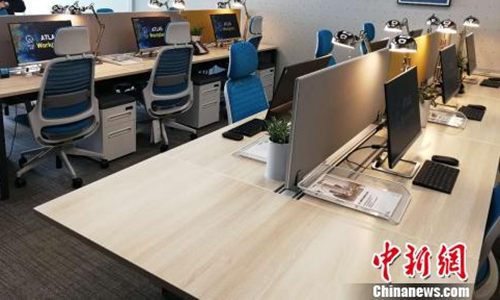
File Photo: Chinanews.com
As gathering with others carries a potential risk of being infected with the coronavirus, office or study room sharing is obviously not a good idea, so people are choosing to work online or at home to avoid the virus.
"We don't have anyone using our spaces this month," American national Barbara Ex, founder of Shanghai-based WhiteSpace, which provides short-term space like meeting and training rooms, told the Global Times.
"This is difficult for us," said Ex. About half of her clients rescheduled and half canceled their appointments.
But she believes those who canceled will come back when the situation is clear. "The basic need for people to meet face to face doesn't go away," she said.
Ex thinks that the pressure on vacant office space will increase, which gives commercial office building owners incentive to seek them out. She said she believes the economy and business environment in the country will provide more opportunities.
Trade in the office sharing sector saw an increase of 87.3 percent in China, from 11 billion yuan in 2017 to 20.6 billion yuan in 2018, according to a 2019 report by The State Information Center of China.
Since 2019, a new type of space sharing, paid study rooms, are showing up in China's first-tier and second tier cities like Beijing, Shanghai and Chengdu of Southwest China's Sichuan Province, winning over young users who need a place outside home or the office for self-improvement. But now the emerging business also faces challenges.
"It is challenging for a low-profit business like ours," Liu Kangcan, owner of Zhongxue Space, a privately run study room brand in Shanghai, told the Global Times. He is now consulting with property management offices about when he should open new branches.
Liu predicts that the impact on his business from the epidemic could last at least three months. Previously, he planned to open 50 new study rooms in different cities in 2020. Now he has to postpone those ambitious plans as the financing is temporally stalled because of the epidemic.
But Liu believes that his business can ride out the epidemic. He thinks that the NCP outbreak will force some small scaled study rooms, especially those which have not yet made a profit, to reconsider their investment strategy, which will bring a change to the whole market landscape.
A number of Chinese cities, including Beijing, Qingdao of East China's Shandong Province and Suzhou of Jiangsu Province have rolled out measures to help enterprises withstand the impact of the NCP. Shanghai on February 8 also rolled out 28 supportive measures, including favorable financing policy, tax incentives and reducing or exempting rent.
Shared spaces depend on customer visits. Zhang Huiming, head of Enterprise Research Institute, Fudan University, told the Global Times that rents exemption may help such companies against the NCP outbreak. He predicts that a certain number of companies with such business models may not survive the epidemic.
However, he thinks that companies which previously made solid inroads still have a chance of seeing out this epidemic and achieving continued growth if they adjust their business models.
